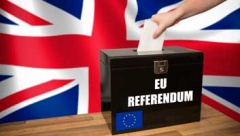Brexit
 | |
| Date | March 2017 - 2019 |
|---|---|
| Interest of | Camila Carlbom, Joanna Cherry, Dominic Cummings, Michelle Dewberry, Nigel Farage, Paddy Hannam, Gina Miller, Brendan O'Neill, Gloria De Piero, Alan Riley, Dominique Samuels, Spiked Online, Wolfgang Streeck, Rishi Sunak, Eloise Todd, Guy Verhofstadt, John Ward |
Brexit, a portmanteau of the words "British" and "exit", is the process by which the United Kingdom (UK) intends to withdraw from the European Union (EU), as a result of the June 2016 EU Referendum in which 51.9% voted to leave the EU.[1]
Article 50
On 2 October 2016, the first day of the Conservative Party conference, Prime Minister Theresa May announced she would trigger Article 50 of the Treaty on European Union by the end of March 2017 which would make the UK set to leave the EU by the end of March 2019. Although the terms for withdrawal have not been established, May has promised a Bill to remove the European Communities Act 1972 from the statute book and to transfer existing EU laws into the UK domestic law.[2]
Parliamentary debate
In a House of Commons debate on 11 October 2016, the Shadow Brexit Secretary Sir Keir Starmer put 170 questions about Brexit to the government and sought an assurance that Parliament would be given a vote on the terms of the exit negotiations:
- "We do accept and respect the result of the referendum. But neither those who voted to remain nor those who voted to leave gave the government a mandate to take an axe to our economy. By flirting with Hard Brexit the Prime Minister puts at risk Britain's access to the single market rather than doing the right thing for jobs, for business and for working people in this country. So much for putting the national interest first!"[3]
For the government, Brexit Secretary David Davis said he was not prepared to outline Brexit aims in detail since it was “not black or white” whether the UK would stay in the single market and Parliament could not expect to be given every detail of the government’s plans for leaving. Davis said the government had a mandate to get the best possible deal but insisted he could go no further than talking about overarching aims because revealing the UK’s top priority would prove “extremely expensive”. Sterling fell to one of its lowest ever levels of $1.22 as David Davis was speaking.[4]
Background
The process of withdrawal from the European Union has, since 2007, been governed by Article 50 of the Treaty on European Union. No member state has ever left the EU. Under Article 50, the withdrawal must be in accordance with the Member State's constitutional requirements and uncertainty exists as to the constitutional requirements in the UK. Unless extensions are agreed to unanimously by the Council of the European Union, the timing for leaving under the article is two years from when the UK gives official notice, but this official notice was not given immediately following the referendum in June 2016. The assumption is that during the two-year window new agreements will be negotiated, but there is no requirement that there be new agreements.[5] Some aspects, such as trade agreements, may be made difficult to negotiate by the EU until after Britain has formally left the EU.[6]
Withdrawal has been the goal of various individuals, advocacy groups, and political parties since the UK joined the European Economic Community (EEC), the predecessor of the EU, in 1973, though continued membership of the EEC and the Common Market was approved in a 1975 referendum by 67.2% of votes.
References
- ↑ "UK officials seek draft agreements with EU before triggering article 50"
- ↑
{{URL|example.com|optional display text}} - ↑ "Red-faced Iain Duncan Smith takes back bizarre claim one of Britain's top barristers is a 'second-rate lawyer'"
- ↑ "Pound falls back as Davis says government cannot outline Brexit aims in detail"
- ↑ "EU referendum: Would Brexit violate UK citizens' rights?". BBC News. Retrieved 5 July 2016.Page Module:Citation/CS1/styles.css must have content model "Sanitized CSS" for TemplateStyles (current model is "Scribunto").
- ↑ "UK officials seek draft agreements with EU before triggering article 50"